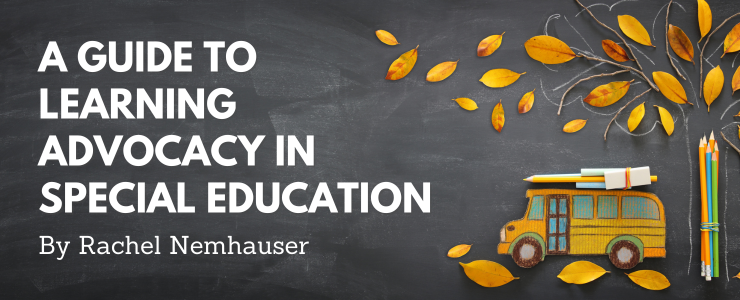A Guide To Learning Advocacy in Special Education
Written by Rachel Nemhauser, The Arc of King County
 I am the parent of an autistic teen who has been receiving special education services for over 15 years, and it’s fair to say that in that time I’ve learned a thing or two about how the system works. I didn’t start off knowing much, and in fact I spent the first seven or eight years doing my very best to advocate and engage while having very little idea how to do either one. The experience was often painful and frustrating because I wanted so much to ensure my son got what he needed and was entitled to at school, but I just didn’t know how. As time went on, I gradually began to learn and understand more, especially through my work creating and overseeing the IEP Parent Partner program at The Arc of King County, and my experience improved.
I am the parent of an autistic teen who has been receiving special education services for over 15 years, and it’s fair to say that in that time I’ve learned a thing or two about how the system works. I didn’t start off knowing much, and in fact I spent the first seven or eight years doing my very best to advocate and engage while having very little idea how to do either one. The experience was often painful and frustrating because I wanted so much to ensure my son got what he needed and was entitled to at school, but I just didn’t know how. As time went on, I gradually began to learn and understand more, especially through my work creating and overseeing the IEP Parent Partner program at The Arc of King County, and my experience improved.
The more I learned about the basics of special education the more effective my advocacy efforts became, and the less frustrated I felt. It was so empowering to know my son’s rights, and to finally feel like an equal member of the IEP team. It is my fervent wish that all parents of special education students receive the information and training they need to be the effective advocates they want to be. Special education is complex, confusing, and often overwhelming, but some basic information can make a significant difference. With that in mind, I’ve compiled a list of 10 fundamental principles I think are helpful for all parents to understand.
Ten Tips for Advocating for Your Child
- Understand the legal basics: There are two federal laws that govern special education services. The Individuals with Disabilities in Education Act (IDEA) guarantees a free and appropriate public education (FAPE) for eligible children and youth with disabilities. Section 504 of the Rehabilitation Act allows for reasonable accommodations as necessary for each student for them to be able to access their education. The laws are complicated and dense, but if you understand this it will take you a long way in your advocacy: A child with a disability has a right to an education with his general education peers, and is entitled to make substantial progress in his or her learning. Challenging and aggressive behavior, complex medical needs, or unique learning requirements do not diminish those rights in any way.
- Know what an IEP Is: An Individualized Education Plan (IEP) is a legally binding contract that lays out the special education instruction, supports, and services a student needs to thrive in school. A parent is an equal member of the IEP team who has a right to request a meeting with the IEP team at any time.
- Know the difference between accommodations and modifications: Modifications appear in an IEP. They are changes to the general education curriculum, and change WHAT is being taught or learned. Accommodations appear on a 504 Plan or an IEP and change HOW the student learns or shares their knowledge.
- Understand evaluations and the IEP process. In order to qualify for special education services, a student needs to be evaluated and found to be significantly behind their general education peers in one or more areas. The IEP team uses the evaluation results to create the student’s IEP, and uses data throughout the year to check progress on goals. The IEP is rewritten and revised at least once every year, and the student is re-evaluated at least every three years.
- Learn to speak the language of data. All special education decisions should be data driven, including changes to the IEP, level of support provided, and student placement. Parents should expect to receive quarterly IEP progress reports, and can use them to track their student’s progress on goals. When asking for a change or sharing a concern, focus on what the student needs to meet their IEP goals.
- Know how and when to discuss placement. Inclusive education is a legally supported, evidence-based best practice that shows improved outcomes for ALL students. IDEA requires students to be placed in the least restrictive environment (LRE), and to the maximum extent appropriate, school districts must educate students with I/ DD in the regular classroom with typical peers, unless the IEP requires another arrangement. Most important when you’re discussing placement with the team, keep in mind that educational needs drive IEP goals and IEP goals drive placement.
- Be a behavior detective: Behavior is communication. Consider a Functional Behavior Assessment (FBA) to learn more about the behaviors interfering with your student’s learning. Once an FBA has been completed, a Behavior Intervention Plan (BIP) and behavior goals may be added to the IEP. Remember, schools are required to teach our children, regardless of challenging behaviors, and to keep all children safe while doing so. Being sent home or forced to learn in isolation due to challenging behaviors is not acceptable. If this happens, an IEP meeting and a revision/creation of a behavior plan may be in order.
- Follow the hierarchy. When advocating for your child, it’s helpful to know who your student’s IEP Case Manager is, and who the decision makers are. If you aren’t getting the answers you need, work your way up the ladder: Teacher/Special Ed Teacher/Therapist >School Principal > Special Education Administrator Director of Special Education > Superintendent. Respect the hierarchy and don’t jump ahead!
- Know your options for conflict resolution: Washington State’s Office of the Superintendent of Public Instruction (OSPI) gives us multiple options to resolve disputes with the IEP team. You can read about them here: https://ospi.k12.wa.us/student-success/special-education/dispute-resolution
- Be thoughtful when working with the IEP team. Consider balancing relationship vs. advocacy. Can you be friends with the IEP team members? Should you be? There are no right answers here, but knowing how important a trusting and collaborative relationship with the team can be, it’s worth thinking about how you want to show up to those meetings and interactions.
For additional information about special education:
- Wrights Law (www.wrightslaw.com) Extensive parent-friendly information about special education law and advocacy nation-wide.
- US Department of Education IDEA website (http://idea.ed.gov/) The federal government’s website about the IDEA Act that dictates special ed law. Has extensive information about each area addressed in IDEA.
- Office of the Superintendent of Public Instruction (OSPI) Special Ed Parent Liaison (http://www.k12.wa.us/ specialed/families/assistance.aspx) Available as a resource to parents in non-legal special education matters to answer questions, provide info/referral, and assist parents to understand the complaint process. Does not advocate on behalf on any one party.
- WA State Governor’s Office of the Education Ombuds (OEO) (www.oeo.wa.gov) OEO can serve as a neutral third party between families in public schools and may attend IEP meetings on occasion.
I also encourage you to reach out to the IEP Parent Partner program at The Arc of King County! We’re available to answer questions, provide support, or even match you with other parents who have been through similar experiences! You can reach us in English at ask@arcofkingcounty.org or 206-829-7053, or in Spanish at preguntas@arcofkingcounty.org or 206-829-7030. This stuff can be hard, and you should not have to do it alone. Support is available, so please reach out if you need us.
*This piece was written for the Informing Families 2023 Fall Newsletter.





